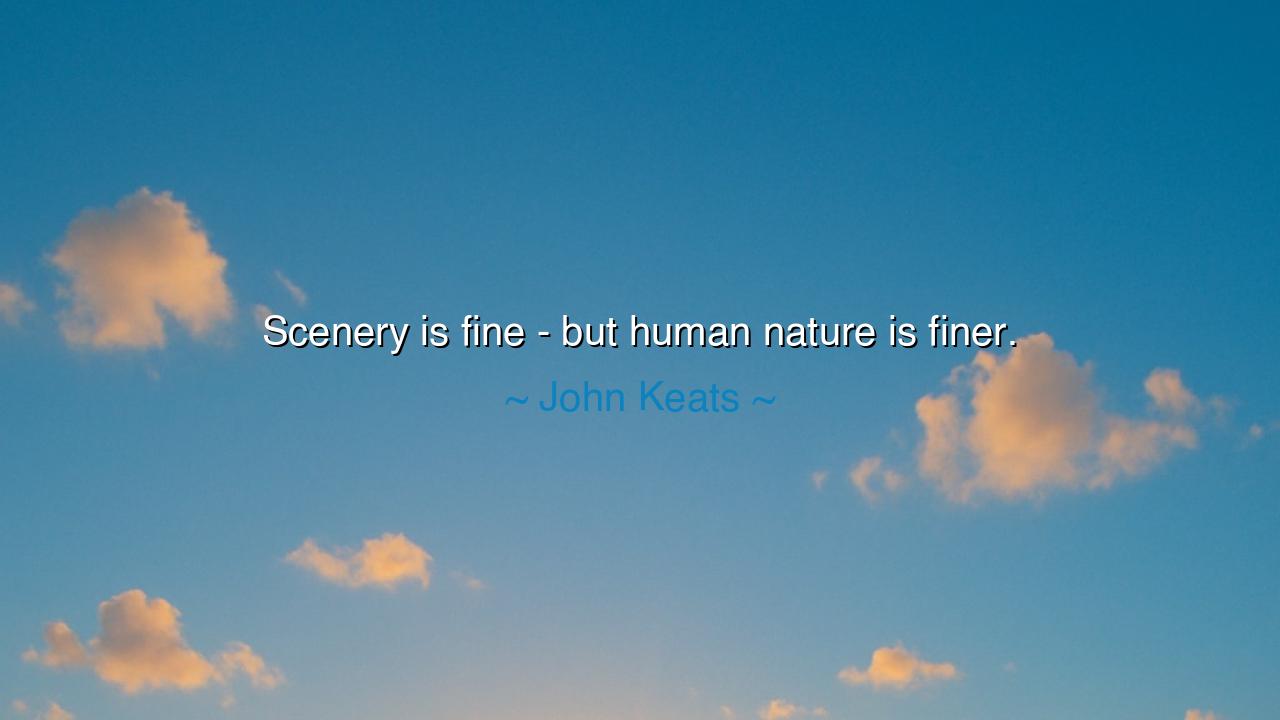
Scenery is fine - but human nature is finer.






The poet John Keats, in a phrase simple yet thunderous, declared: “Scenery is fine — but human nature is finer.” With these words, he did not scorn the beauty of mountains, the majesty of oceans, nor the brilliance of sunsets, but he reminded us that the human soul, in its capacity for love, courage, and sacrifice, surpasses even the most splendid visions of earth. For though the heavens blaze with stars, it is the beating heart of man that dares to hope, to suffer, and to create beauty greater than stone or sky. Nature may awe us with its grandeur, but human nature reveals the mystery of spirit, the power of will, and the boundless reach of compassion.
Keats, a poet of Romantic fire, lived close to the edge of suffering, for death shadowed him early, and the world denied him long life. Yet in the brevity of his years he perceived eternal truths. He beheld the loveliness of valleys, of Grecian urns, of nightingales in song, but he also felt the nobility of man’s inner being. He understood that a single act of kindness, a single spark of friendship, or the warmth of loyal love, outweighs the fairest landscape. For scenery, though divine, is silent; but human nature speaks, consoles, uplifts, and endures.
Look to the tale of Desmond Doss, the soldier of World War II who went to battle without a weapon. Amid the inferno of Okinawa, where shells shattered the earth and blood drenched the soil, Doss carried his wounded comrades upon his shoulders, one by one, saving seventy-five lives. The cliffs were steep, the night was dark, and death was near, yet he pressed on with the prayer, “Lord, help me get one more.” In that hour, no mountain peak nor ocean vista could equal the majesty of human courage and compassion embodied in a single frail man. That is what Keats meant: scenery is fine, but human nature is finer.
The mountains inspire us with their height, but man’s spirit climbs higher still. The rivers run with strength, but man’s devotion runs deeper. The stars shine in the firmament, but the love of one heart for another casts a light more tender, more enduring, than the glow of distant suns. Keats knew that the natural world is a mirror, but the essence of man is a flame — a fire that burns against the cold vastness of the universe, declaring that we are not merely spectators, but participants in creation’s glory.
Thus, the lesson is clear: admire the world around you, but never forget the greater beauty within and among you. A sunset may move the eye, but a generous deed moves the soul. A mountain may lift the gaze upward, but a humble act of service lifts humanity itself. The perfection of a landscape fades with nightfall, but the perfection of virtue shines on through memory, through history, and through the hearts of those touched by it.
And what then must we do? We must cultivate the garden of our own nature. We must tend the seeds of kindness, of courage, of forgiveness, as diligently as a farmer tends his field. Let us not be content to gaze at beauty afar, but let us strive to be beauty incarnate through our deeds. When tempted to retreat into selfishness, recall that every act of benevolence adds a brighter color to the living canvas of mankind.
Remember this, O children of time: the valleys and oceans, the forests and skies, will one day pass away, but the story of a compassionate heart remains eternal. Live so that your life may testify that while scenery is fine, the spirit you bear is finer still. In this way you honor Keats, not by echoing his words, but by proving them with the glory of your own humanity.






AAdministratorAdministrator
Welcome, honored guests. Please leave a comment, we will respond soon